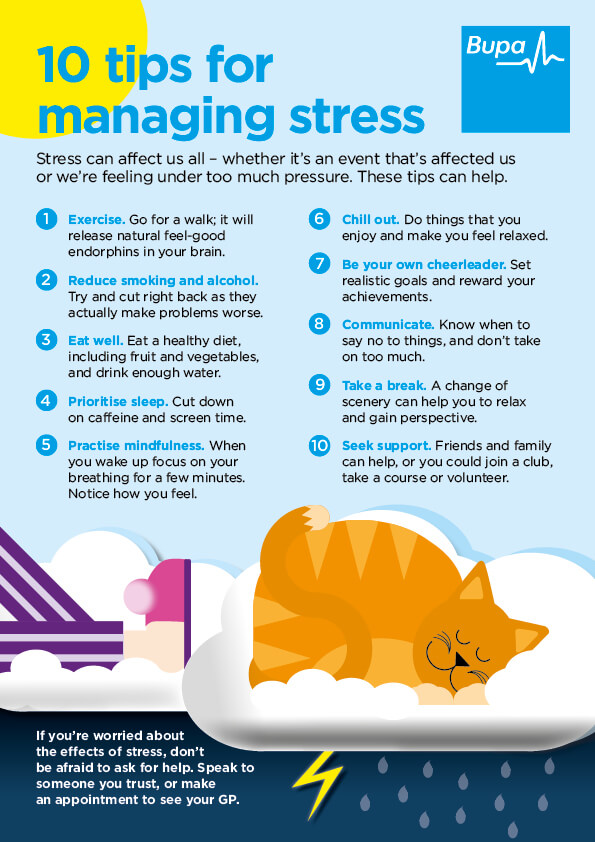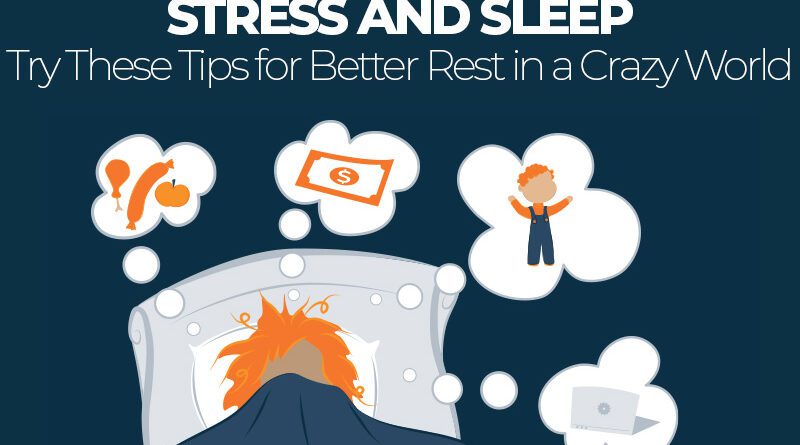Sleep Well: Tips and Techniques for Stress Management
Ever wondered how a peaceful night’s sleep can be an antidote for your daily stress? It’s an interesting thought, isn’t it? Have you experienced those nights where your mind refuses to turn off, leading to countless hours of tossing and turning, only to wake up the ensuing morning drained of energy? It’s a common problem faced by many, and in this article, we will explore the detrimental effects of stress on our sleep patterns and share effective tips and techniques to manage this menace. We will delve into various aspects – from understanding the quality stages of sleep needed for stress management to simple yet effective stress relief techniques, this article has it all.
There’s so much to learn about how sleep plays a vital role in managing our stress levels. I will share my insights about breathing exercises that aid in calming our mind before we hit the sack. We will discuss the importance of sleeping well for mental health and how it benefits everyone, including the elderly grappling with anxiety. If books are your thing, we’ll introduce recommendations from pioneers in the field with proven techniques for a low-stress sleep. But if you prefer a more modern approach, I’ll provide an overview of applications designed to help you sleep well as part of anxiety and stress management. Trust me, by the end of this article, you’ll be empowered with knowledge on how to make benign the twin forces of stress and anxiety, leading to a restful sleep. Well: Tips and Techniques for Stress Management

Understanding the Importance of Sleep in Stress Management
As we navigate through life, we encounter stressful situations. But how we manage stress can significantly affect our well-being.
The role of sleep in maintaining mental health
Sleep is more than just a period of rest; it is an essential part of maintaining our mental health. During sleep, our bodies and minds recharge, allowing us to tackle the new day with renewed energy and optimism. Furthermore, sleep is the time when the brain processes emotions, consolidates memories, and reinforces learning. In a world that often values productivity over health, it’s crucial that I remind myself of the importance of quality sleep.
How poor sleep can contribute to stress and anxiety
Sleep deprivation can be a significant factor contributing to stress and anxiety. When we lack sleep, our bodies enter a state of high alert, increasing the production of stress hormones. Additionally, insufficient sleep impairs our cognitive abilities, causing difficulties in decision-making and problem-solving, which can amplify stress levels.
Optimizing the Duration of Sleep for Stress Relief
How long should we sleep? The answer isn’t as straightforward as you might think.
Determining the right amount of sleep
Though the sleep requirements can vary based on factors like age, lifestyle, and overall health, most adults require between 7 to 9 hours per night. Getting the ideal amount of sleep can help maintain cognitive functions, prevent mood swings, and reduce stress levels.
Debunking myths about sleep duration
Beware of common misconceptions about sleep duration. Sleeping more than what’s required doesn’t necessarily equate to better health. Oversleeping may potentially lead to health problems like depression, obesity, and increased risk of certain diseases.
Enhancing the Quality of Sleep for Effective Stress Management
Sleep quality is as important as sleep quantity. Here’s why and how to achieve it.
Understanding the stages of quality sleep
A good sleep consists of several cycles of sleep stages, from light sleep to deep sleep and REM (rapid eye movement) sleep. Each stage has its role in restoring our minds and bodies. One vital factor for quality sleep is achieving an adequate number of these cycles.
Techniques to improve sleep quality
Improving sleep quality often involves lifestyle changes. Regular physical exercise, minimising exposure to blue light before bedtime, and maintaining a consistent sleep schedule are just a few techniques I found helpful.
Lifestyle Changes to Improve Sleep and Manage Stress
Creating an environment conducive to sleep and general well-being is essential for managing stress.
Creating a sleep-friendly environment
Ensure your sleeping environment is dark, quiet, and at a comfortable temperature. Investing in quality pillows and mattresses can also improve sleep quality.
Dietary habits promoting quality sleep
Certain foods and drinks can interfere with sleep. It’s best to avoid caffeine and alcohol close to bedtime. Instead, opt for foods rich in tryptophan, magnesium, and calcium like almonds, bananas, and milk.
The impact of physical exercise on sleep and stress management
Regular exercise not only boosts physical health but also promotes better sleep. It helps decrease anxiety levels, lower stress hormones, and promotes feelings of relaxation.

Relaxation Techniques to Facilitate Better Sleep
Next, let’s explore some relaxation techniques that could facilitate better sleep.
Benefits of headstand for stress management and sleep
Headstands, though not for everyone, can increase blood flow to the brain, creating a calming effect and promoting better sleep.
Breathing exercises for better sleep and stress management
Deep breathing exercises before bed can lower stress levels and heart rate, preparing your body for sleep.
Brainwave sleep techniques for stress management
Brainwave sleep techniques, like binaural beats, can significantly improve sleep by essentially “tuning” the brain to sleep-ready frequencies.
Effective Ways to Manage Anxiety for Optimal Sleep
Anxiety can significantly disrupt sleep patterns. But there are ways to manage it.
How stress and anxiety impact sleep patterns
The constant worries and tensions associated with anxiety can make it difficult to fall asleep, leading to sleep disruptions and insomnia.
Techniques to reduce bedtime anxiety for better sleep
Practices like yoga, meditation, and mindfulness exercises can help manage anxiety before bedtime. It’s also beneficial to establish a soothing pre-sleep routine to signal your body that it’s time to wind down.

Exploring Sleep Aids and Stress-Relief Tools
There is an abundance of tools available to aid sleep and relieve stress.
Useful apps to promote quality sleep
There are several mobile apps designed to enhance sleep. They offer features like sleep tracking, guided meditations, and ambient noises.
Relevant books for stress and sleep tips
Books that offer strategies for managing stress and improving sleep can be valuable resources, such as “Why We Sleep” by Matthew Walker.
Potential role of sleep supplements in managing stress
Natural sleep supplements, like melatonin and magnesium, may help some individuals achieve better sleep. However, it’s vital to consult with a healthcare professional before starting any supplement regimen.
Tailoring Sleep and Stress Management Techniques for Different Age Groups
Sleep and stress management strategies are not one-size-fits-all. They often need to be adapted to a person’s age and lifestyle.
Adapting techniques for the elderly
Due to age-related changes, seniors may experience disturbances in sleep patterns. Techniques for this age group could include physical activity during the day, maintaining a regular sleep schedule, and ensuring a safe and comfortable sleep environment.
Sleep and stress management in young adults
University students and working youth often suffer from poor sleep due to their demanding schedules. Tips for them include avoiding all-nighters, practicing good sleep hygiene, and managing their workload efficiently.
Addressing sleep and stress issues in children
Establishing a regular sleep schedule, creating a comforting pre-bedtime routine, and limiting the use of electronic devices before bedtime can help children achieve better sleep.

Understanding Sleep Disorders and Their Impact on Stress
Let’s delve deeper into how sleep disorders and stress correlate.
Common sleep disorders contributing to stress
Sleep disorders like insomnia, sleep apnea, and restless legs syndrome can lead to both physical and emotional stress. They often induce a cycle of sleep deprivation leading to higher stress levels, which in turn leads to further sleep disturbances.
Treatment options for sleep disorders
Treatment options differ based on the specific sleep disorder. They range from lifestyle changes and therapy to medication and surgical interventions. If you suspect you have a sleep disorder, it’s crucial to seek professional help.
Low-Stress Sleep: Tips and Practical Approaches
Regularly practicing mindfulness can contribute to stress-free sleep.
Practicing mindfulness for stress-free sleep
Mindfulness involves focusing on the present moment without judgment. This practice can calm the mind, reducing feelings of anxiety and stress, and thus promoting better sleep.
Guided relaxation and meditation exercises for better sleep
Audio-guided relaxation and meditation exercises can be useful tools for managing stress before bedtime, helping your body and mind prepare for sleep.

Importance of Regular Sleep Pattern in Stress Management
Maintaining consistency in sleep routines can be a game-changer for your overall well-being.
Link between irregular sleep schedule and increased stress
Sleep schedule irregularities might confuse our body’s internal clock, resulting in disruptions to sleep quality and duration. This can lead to an increase in stress hormones and heightened anxiety.
Benefits of maintaining regular sleep patterns
A regular sleep pattern aligns us with our internal body clock, known as the circadian rhythm. This makes falling asleep and waking up easier and can significantly enhance the quality of our sleep.
Strategies for Coping with Stress for Restful Sleep
Successfully managing stress can lead to more restful nights.
Identifying stress triggers and managing them
It’s important to understand what triggers your stress, be it work, financial worries, or personal relationships. Once these are identified, you can undertake strategies to manage them.
Building resilience against stress for better sleep
Resilient individuals can cope better with stress, resulting in better sleep. Building resilience may involve maintaining positive relationships, practicing self-care, and seeking professional help when necessary.
Role of Professional Help in Managing Sleep and Stress
Finally, let’s not underestimate the role of professional help in managing sleep and stress.
When to seek professional help
If your sleep problems and stress persist despite your best efforts, it’s advisable to seek help from professionals.
Types of professionals who can provide help
Psychiatrists, psychologists, and sleep specialists are well-equipped to manage sleep disorders and stress-related issues.
Different therapies available for managing stress and achieving better sleep
Cognitive-behavioral therapy, for instance, can be effective in managing sleep disorders and anxiety. Additionally, relaxation therapy, mindfulness-based stress reduction, and lifestyle coaching can help in reducing stress levels.
Conclusion
While sleep is often underrated, it is an essential contributor to our physical health and emotional wellbeing. Prioritizing sleep and following practical strategies, such as maintaining a sleep-friendly environment, optimizing sleep duration and quality, and managing stress, can make a significant difference in your sleep and stress levels.
Remember, everyone is different, so it might take time to figure out what works best for you. And most importantly, don’t hesitate to seek professional help if needed. With patience and persistence, it is possible to achieve better sleep and effectively manage stress.

